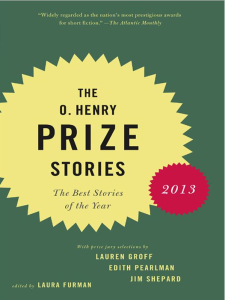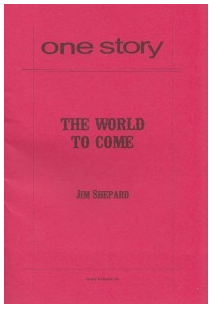Jim Shepard's Blog, page 4
November 2, 2013
Jim Shepard a Juror for O Henry Prize
Here’s another collection to put on your bookshelf. Jim Shepard selected these stories along with Lauren Groff and Edith Pearlman. Jim also contributes an essay on the story he admires most. Buy the volume from Amazon or Powell’s.


Jim Pays Tribute to Alice Munro
The short story has had its moment of glory this year with the wonderful Alice Munro winning the Nobel Prize for Literature this year. Jim, a master of the short story himself, had this to say in a Washington Post article:
“I imagine fiction writers everywhere today are celebrating the Nobel Committee having gotten it exactly right. There’s probably no one alive who’s better at the craft of the short story, or who has done more to revolutionize the use of time in that form, the result often being a 20-page story that demonstrates the breadth and scope of a novel.”
Click here to read the full article. And we’re sure that lovers of short stories are still celebrating Alice Munro’s win, and hoping the short story continues its time in the spotlight.


November 1, 2013
“The World to Come” in Best American Short Stories 2013
As you might have read in a previous post, Jim’s story “The World to Come” has been included in the Best American Anthology this year. The story is a love story between two nineteenth century farm women and originally appeared in One Story. Here is a mini interview with Jim from the One Story issue:
Q&A by Hannah Tinti (Taken from One Story website which you can find here)
Where did the idea of this story come from?
I’d come across a book chronicling the worst storms in the history of New England. (That’s the kind of book I tend to read.) I was struck, going through it, by just the day-to-day arduousness and loneliness of the farmers’ lives. That led me to other histories and journals and diaries, and I came across a farmer’s one-line notation about how sad his wife was, because her one friend had moved away.
The details of “The World to Come” feel so authentic—from the farming tools to the medicinal herbs. How much research did you do to create this world?
I started researching last June, and, though I was also doing other things in the meantime, didn’t start writing until early December.
Why did you decide to tell this story in the format of journal entries, instead of a straight narrative?
I wanted to catch if I could the moment-to-moment and day-to-day nature of 19th century farming lives, as well as how seasonally based those lives were: the importance of the weather, and their meals, and of course the drudgery. But the journal nature of the story also seemed crucial when it came to capturing all of the little ways in which the narrator has let her Tallie down.
Do you think it was only desperate circumstances that drew these women together, or was it a deeper connection? And did you know from the start this would be a love story?
Unsurprisingly, I think it was both. I do think they would have been powerfully drawn to one another even had they met under less desperate circumstances, but then, they don’t consider the circumstances particularly desperate (until the end). And almost immediately I knew it would be a love story; the question at that point became how repressed a love story it would be.
At one point the narrator, thinking of her pioneer mother (born in 1780), remarks: “I wonder now at the courage and the resourcefulness of those women who fared forth, not knowing where they were being led, to begin to chip into the wilderness the foundations of a civilization.” This story in many ways feels like a tribute to these women—and the losses they were forced to bear. The narrator and Tallie are the next generation, but their lives continue to be severely limited and contained. Is that partly what drew you to write about this time period (1850s)?
That is, yes. Once I decided to write about farm women rather than men, the unsung nature of the burden they bore seemed very clear.
One of the most striking sections is the earthquake that Dyer’s mother goes through. Why did you decide to include this story within a story?
I thought it important to have a figure in the story for another, more terrifying kind of disaster, and for how precarious farmers felt their footholds in their livelihoods (and lives) to be.
Why did you title this story “The World to Come”?
I liked the way in which our narrator early on assures us that she has stopped worrying about that notion, and then finds that Tallie has created for her an entirely new version of a world to come. And then the sadness of imagining what that world to come must look like, for the narrator, once Tallie is dead.
What is the best bit of advice about writing you have ever received?
My thesis advisor at Brown University, John Hawkes, always told me to look for the weirdness in my own work. There was plenty to find.


October 31, 2013
The Best American Short Stories 2013
We’re really pleased to see that Jim’s story “The World to Come” has been included in the The Best American Short Stories Anthology.
The story is about 19th century farm women. And it’s a love story. More to come in our next post. In the meantime, buy your copy of this anthology here or here.


June 5, 2013
Jim Shepard’s Teaching Copy of a Flannery O’Connor Classic
You should check out this “BooksbyHeart” tumblr by Joe Fassler, in which “Writers share their dearest literary quotations: lines they’ve committed to memory, taped up by their desks, tattooed on their biceps, triple-starred and underlined.”
Here is a scanned page from Jim Shepard’s teaching copy of “A Good Man is Hard to Find.” According to Joe, “Wow. It’s visually stunning, but if you squint at the notes there’s some great pearls of wisdom about the story.”


June 3, 2013
Jim reads at the Colgate Writer’s Conference
Jim reads at the Colgate Writer’s Conferenc
June 2, 2013
The Percheron in the Tunnel
Jim Shepard, the J. Leland Miller Professor of American History, Literature, and Eloquence, presents “The Percheron in the Tunnel.” Delivered July 16, 2012, as part of the Williams Thinking lecture series


May 31, 2013
the Harlequin Interview
“Most of the literature about which I care passionately has a distinct ethical dimension; most — given its project of showing us how we live, in emotional and ethical terms — is concerned in some way with the issue of how to live.”
Read the rest of the interview here.


March 15, 2012
Jim Shepard in One Story Magazine!!!
Jim is featured in the new issue of One Story magazine. This is truly a wonderful, wonderful literary publication and well worth a subscription.
Read the post about the new issue here.
Here is an excerpt from the story:
Fair and very cold. This morning, ice in our bedroom for the first time all winter, and in the kitchen, the water froze on the potatoes as soon as they were washed. Landscapes of frost on the window-panes.
With no pride and little hope and only occasional and uncertain intervals of happiness, we begin the new year. Let me at least learn to be uncomplaining and unselfish. Let me feel gratitude for what I have: some strength, some sense of purpose, some capacity for progress. Some esteem, some respect, and some affection. Yet I cannot say I am improved in any manner, unless it be preferable to be wider in sensation and experience.
My husband has since our acquisition of this farm kept a diary to help him see the year whole, and plan and space his work. In his memorandum book he numbers each field and charges to each the manure, labor, seed &c and then credits each with each crop. This way he knows what each crop and field pays from year to year. He asked me as of last spring once we lost our Nellie to keep in addition a list in a notebook of matters that might otherwise go overlooked, from tools leant out to bills outstanding. But there is no record in these dull and simple pages of the most passionate circumstances of our seasons past, no record of our emotions or fears, our greatest joys or most piercing sorrows.








Jim Shepard's Blog
- Jim Shepard's profile
- 302 followers











